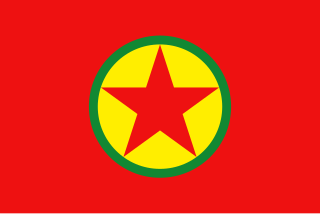
The Kurdistan Workers' Party or PKK is a Kurdish militant political organization and armed guerrilla movement which historically operated throughout Kurdistan but is now primarily based in the mountainous Kurdish-majority regions of southeastern Turkey and northern Iraq. Since 1984, the PKK has been involved in asymmetric warfare in the Kurdish–Turkish conflict. Although the PKK initially sought an independent Kurdish state, in the 1990s its goals changed to seeking autonomy and increased political and cultural rights for Kurds within Turkey.

The Turkish Radio and Television Corporation is the national public broadcaster of Türkiye, founded in 1964. TRT was for many years the only television and radio provider in Türkiye. Before the introduction of commercial radio in 1990, and subsequently commercial television in 1992, it held a monopoly on broadcasting. More recent deregulation of the Turkish television broadcasting market produced analogue cable television. Today, TRT broadcasts around the world, including in Europe, Middle East, Africa, Asia, the United States, and Australia.

The mass media in Turkey includes a wide variety of domestic and foreign periodicals expressing disparate views, and domestic newspapers are extremely competitive. However, media ownership is concentrated in the hands of a few large private media groups which are typically part of wider conglomerates controlled by wealthy individuals, which limits the views that are presented. In addition, the companies are willing to use their influence to support their owners' wider business interests, including by trying to maintain friendly relations with the government. The media exert a strong influence on public opinion. Censorship in Turkey is also an issue, and in the 2000s Turkey has seen many journalists arrested and writers prosecuted. On Reporters Without Borders' Press Freedom Index it has fallen from being ranked around 100 in 2005 to around 150 in 2013.

MED TV was the first Kurdish satellite TV with studios in London, England and Denderleeuw, Belgium. MED TV broadcast programs mainly in six languages, Kurdish, English, Arabic, Assyrian and Turkish.

Osman Baydemir is a Kurdish politician, lawyer and human rights activist. He was the mayor of his home town of Diyarbakır from 2004 to 2014. He was a member of the Grand National Assembly of Turkey for the Peace and Democracy Party (BDP) and also the Peoples Democratic Party (HDP).
Kurds have had a long history of discrimination perpetrated against them by the Turkish government. Massacres have periodically occurred against the Kurds since the establishment of the Republic of Turkey in 1923. Among the most significant is the massacre that happened during the Dersim rebellion, when 13,160 civilians were killed by the Turkish Army and 11,818 people were sent into exile. According to McDowall, 40,000 people were killed. The Zilan massacre of 1930 was a massacre of Kurdish residents of Turkey during the Ararat rebellion, in which 5,000 to 47,000 were killed.
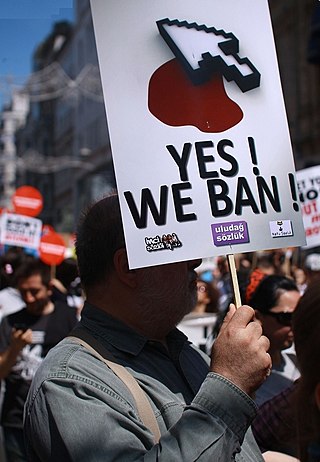
Censorship in Turkey is regulated by domestic and international legislation, the latter taking precedence over domestic law, according to Article 90 of the Constitution of Turkey.

Rojda Aykoç, also known as Rojda Şenses or simply Rojda, is a contemporary Kurdish singer.

Denmark–Turkey relations are the current and historical relations between Denmark and Turkey. Denmark has an embassy in Ankara, and Turkey has an embassy in Copenhagen. Both countries are members of NATO and Council of Europe. Diplomatic relations between Denmark and Turkey were put under pressure in 2014 because of the Jyllands-Posten Muhammad cartoons controversy and the Roj TV affair (Roj TV's broadcasting license was suspended by the Supreme Court in Denmark on February 27, 2014). Denmark is a member of the European Union, Turkey is not a member.
TRT Kurdî is the first national television station that broadcasts in the Kurdish dialect of Kurmanji and in Zazaki. On the channels sixth anniversary it changed its name from TRT 6 into TRT Kurdi. The channel has been mostly met with criticism from the Kurdish population in Turkey on various grounds, including accusations of being a government propaganda tool. A 2018 survey asking Kurds about TRT Kurdî showed that a majority (59%) did not trust the channel.
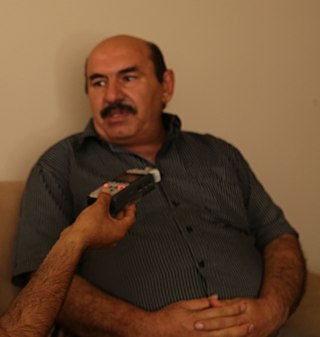
Osman Öcalan was a Kurdish militant and ex-commander of the Kurdistan Workers' Party.
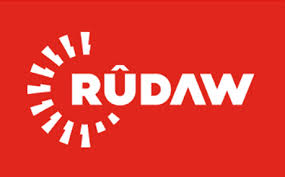
Rudaw Media Network, is a major media broadcaster in the Kurdistan Region, Iraq.
The Firat News Agency (ANF) is a Kurdish news agency that gathers and broadcasts news from the Middle East, broadly concerning Kurdish matters. The news agency has offices in Amsterdam and journalists around the world.
Zaza nationalism is an ideology that supports the preservation of Zaza people between Turks and Kurds in Turkey. The movement also supports the idea that the Zaza people are a different ethnic group from Kurds.
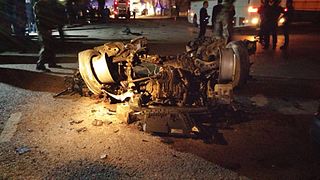
The February 2016 Ankara bombing killed at least 30 people and injured 60 in the capital of Turkey. According to Turkish authorities, the attack targeted a convoy of vehicles carrying both civilian and military personnel working at the military headquarters during the evening rush hour as the vehicles were stopped at traffic lights at an intersection with İsmet İnönü Boulevard close to Kızılay neighborhood. Several ministries, the headquarters of the army and the Turkish Parliament are located in the neighbourhood where the attack occurred. The Kurdistan Freedom Hawks (TAK) took responsibility for the attack and said they targeted security forces. Censorship monitoring organization Turkey Blocks reported nationwide internet restrictions beginning approximately one hour after the blast pursuant to an administrative order. The attack killed 14 military personnel, 14 civilian employees of the military, and a civilian.
Turkey's media purge after the failed coup d'état on July 15, 2016 resulted in the shutdown of at least 131 media outlets and the arrest of 117 journalists – at least 35 of whom have been indicted for "membership in a terror group".
Ronahî TV is a Kurdish television channel focusing on Kurds around the world. The channel was launched in 2012 and broadcasts from EU countries and Syria. Its headquarters are in Qamishli.
On 12 August 2005, Prime Minister of Turkey Recep Tayyip Erdoğan delivered a speech on the subject of the Kurdish issue in Diyarbakır, the largest Kurdish-majority city in Turkey. The speech is characterized by being the most liberal discourse ever at the time conducted by a Turkish head of government on this issue. In the speech, the prime minister conceded that the Turkish state had made mistakes in the past, used the term “the Kurdish question” and vowed to settle it through more democracy, more citizenship law, and more prosperity. The speech was considered "historic" and "groundbreaking" in Turkey. The speech also faced heavy criticism by Turkish commentators and the main opposition party CHP, for putting the unity of Turkey in danger.

A terrorist attack occurred on İstiklal Avenue in the Beyoğlu district of Istanbul, Turkey, on 13 November 2022, killing 6 people and injuring 81 others.












